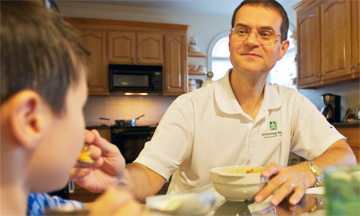
 Talk to a married deacon who was ordained while raising children at the same time, and you’re talking to a busy man.
Talk to a married deacon who was ordained while raising children at the same time, and you’re talking to a busy man.
Although the average age of permanent deacons in the United States is 64, the diocese has its share of younger men who are still working full time and raising families.
Those men, plus their wives and children, say they make it work because it’s a sacrifice they are committed to for the good of the church.
That doesn’t mean it was an easy decision, or an easy road.
Deacons and their wives say it’s a constant juggling act that requires communication and frequent reevaluation of priorities.
When Deacon Jeffrey Mevissen was in formation, he said his biggest hesitation centered on his five children, the youngest of which was 5 at the time.
“I didn’t want to be drawn away from parenting to do ministry,” he said.
Deacon Mevissen and his wife Susan serve St. James Church in Conway.
Their children are mostly grown now, ranging in age from 25 to 17, but when they were young, he said figuring out how to get everything done on a daily basis was a sweat factory.
He was ordained in 2002, along with Deacons Reginald “Regi” Armstrong and James Moore, who were the two youngest deacons in the diocese.
They could have waited until retirement, or at least until the children were grown, but they wanted to live the true mission of the diaconate, with one leg in the working world and one leg in the church to serve as an example of Christian witness.
Deacon Armstrong is at St. Anthony Church in Florence. He and his wife Hsin-Yi have three children: Jacqueline, 19, Creighton, 14, and Godric, 4.
When he was first ordained, his oldest was about 10.
Deacon Armstrong said he remembers the late Msgr. Joseph R. Roth emphasizing how the priorities should run: first comes salvation, then marriage because those were the first vows, then his job, then the diaconate.
But life happens, and sometimes the priorities are shuffled, at least briefly.
“It’s a juggling act sometimes; it’s a balancing act all the time,” Deacon Armstrong said.
Then he chuckles and notes that his wife is snickering at him.
He explains that they just had a discussion about reevaluating their priorities.
“It does take your wife being very understanding and very supportive,” he said. “It would be extremely difficult if she wasn’t.”
Even though the man is the one who is ordained, Deacon Armstrong said it is a joint ministry.
He and his wife teach pre-Cana classes together and make it a point for the family to eat dinner together every night. No TV. No phone calls.
Mrs. Armstrong said she knew it would be a sacrifice, but she has supported her husband the whole time.
Periodically, she said it requires a review of how life is going, and a shift in priorities. Sometimes the children need more attention, or the marriage, or the church.
“Communication is extremely important to deacons and their wives. You can’t be afraid to be open with one another,” Mrs. Armstrong said. “That’s why prayer is so important. Listen to God and He’ll direct you.”
Deacon Armstrong said it’s helpful that his wife can be a stay-at-home mom, giving her time to carry the lion’s share of family responsibilities. When both parents work and devote time to the church, it’s even more of a juggling act.
Deacon Moore and his wife Christina work outside the home and serve Blessed Sacrament Church in Charleston.
They have two sons: Patrick, who just entered the diocesan seminary program; and Alexander, a senior at Bishop England High School.
“Sometimes it’s a struggle,” Deacon Moore conceded. “When you’re done with children at 8, 9, 10 o’clock at night and then you start your work with the church — it can make for some long nights and early mornings.”
One way to maintain a family unit is to collaborate.
Deacon and Mrs. Moore lead high school youth ministry and are directors of religious education at the church.
From the time their sons were young, Deacon Moore said they made an agreement that attending the boys’ events would be their first priority. But the children are expected to give also.
The whole family understands that celebrating Mass on Saturday evening and Sunday is an obligation and a priority.
Because everyone is involved with church, they don’t feel like something is being taken away, but rather that more is being added.
Deacons agree that the pastor has a huge bearing on their role in the church, noting that some priests are deacon friendly and some are not.
For the most part, deacons can expect to devote about 10 hours a week to church duties, on top of family and work.
Sometimes, this means letting go and not stressing about things, like the house or the yard, Deacon Mevissen said with a laugh.
For Deacon Armstrong, the first things to go were his extracurricular activities. Philosophically, he notes that he can pick them up again when he retires. And sometimes a deacon just has to say no.
Deacon Moore said there was a time when he also served as assistant lacrosse coach at Bishop England and taught adult education classes during the week. When he and his wife looked at the busyness of their family, something had to give.
All three men said they are still learning to say no. It’s hard, because the diaconate offers endless ways to help.
“It’s a wonderful ministry,” Deacon Moore said. “There are so many things to do; you can tailor it to fit your passions.”
